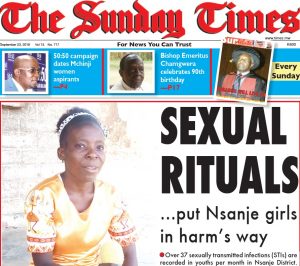The 2018 finalists for the Southern African Media Award in Social Accountability Reporting have been announced. The award, in its second year, is hosted at the annual Highway Africa conference in partnership with the Partnership for Social Accountability (PSA) alliance. The award recognizes that communication and information flows are necessary factors to strengthening social accountability practice. Media are a tool to disseminate and distribute news that do not only inform the general public of current events, but also investigate issues that affect the state of the nation.
Journalism however can be a challenging endevour, especially when dealing with the management of public resources. With shrinking civic spaces and various issues that threaten the well-being of individuals who dare to report on social accountability issues, the PSA alliance deemed it necessary to introduce an award for regional media in order to promote social accountability reporting and coverage in the region.
The aim of the award is to promote high-quality investigative reporting on issues of social accountability, specifically on HIV / Sexual Reproductive Health and Rights (SRHR) and food security in Malawi, Mozambique, Tanzania and Zambia. The 1st Southern Africa Media Award in Social Accountability was presented in 2017 during a gala awards dinner held at the 21st annual Highway Africa conference, the world’s largest gathering of African journalists, at Rhodes University in Grahamstown, South Africa.
The PSA alliance is planning on presenting their second award at the 2018 Highway Africa conference gala dinner to be held at Rhodes University, South Africa. Three awards will be offered to the successful entries for 1st, 2nd prize and 3rd prize (USD 450 for 1st prize • USD 200 for 2nd prize • USD 100 for 3rd prize).
The three final stories in the running for the awards inspire us all to be much more vigilant about issues concerning the management of resources, but not only that, they also provide valuable information that could be used by other social accountability actors to advocate for change. The award is to honor the work that these journalists do and show the appreciation for the information and knowledge they distribute to their respective communities. Here are details of the stories selected as finalists – these are in no particular order – the winner will be announced at the gala event on the 29th November:
- The harm being done to young girls in the Nsanje district in Malawi as a result of sexual rituals was investigated by journalist Josephine Chinele in her report in the Sunday Times. Her story included information from the District Hospital, youth in the area and the district commissioner. The full article authored by Josephine Chinele is accessible on https://www.times.mw/sexual-ritauls-put-nsanje-girls-in-harms-way/

- Food security is a serious challenge in most African countries. Derrick Chityamba produced a news report investigating the management of initiatives targeting farmers in Zambia. The government implemented a project which aimed to assist local and small business farmers to better access their supplies. To partake in the programme, farmers had to contribute a fund to the government and then receive a card which, once activated, would allow them to procure their supplies from the supplier of their choice. The delays in the roll-out of the project highlights issues with the activation of cards, farmers not being able to procure the resources they need and missing their farming seasons. The news report talks to various stakeholders including farmers, government officials, farmer’s association, and suppliers to understand how these problem affect those involved and the plans to mitigate the challenge. The news report can be accessed below:
- This news report investigated by Winston Mwale started when community members in Malawi reported suspicious activity to the government officials and requested assistance. The community members suspected the foreman of a construction company that was hired to build a maternity ward at a local clinic of embezzling the resources to build his own house. They were mainly concerned for the integrity of the structure of the buildings that were supposed to be constructed. The reporter interviewed a number of individuals who reported seeing the foremen moving material and human resources from the clinic to his site. The foreman and the company denied the accusations, however, stating that there was no misuse of resources and ensuring the community that the structure at the maternity ward was not going to be compromised. The reporter also interviewed an ActionAid representative who works with the community to empower them to monitor the use of public resources. He stated that it was a progressive step, because the community was able to monitor the problem and followed the necessary steps to ensure accountability. The full news report can be accessed below:
In its inception, the Partnership for Social Accountability (PSA) alliance ensured that media was one of their five target groups, as well as a beneficiary. The PSA is a partnership between ActionAid International, PSAM, ESAFF and SAfAIDS, who were awarded a tender by the Swiss Agency for Development and Cooperation (SDC) to implement the first three-year phase (2016-2019) of a public resource management (PRM) project in Zambia, Malawi, Tanzania and Mozambique.
The main aim of the project is to “to improve public service delivery in agriculture (food security), and health (HIV/AIDS, sexual and reproductive health and rights). This is done through strengthening the oversight and social accountability roles of five target groups in the SADC region, specifically: selected parliamentary committees, relevant government departments, issue-based civil society organisations (CSOs), smallholder farmer organisations, and the media”
